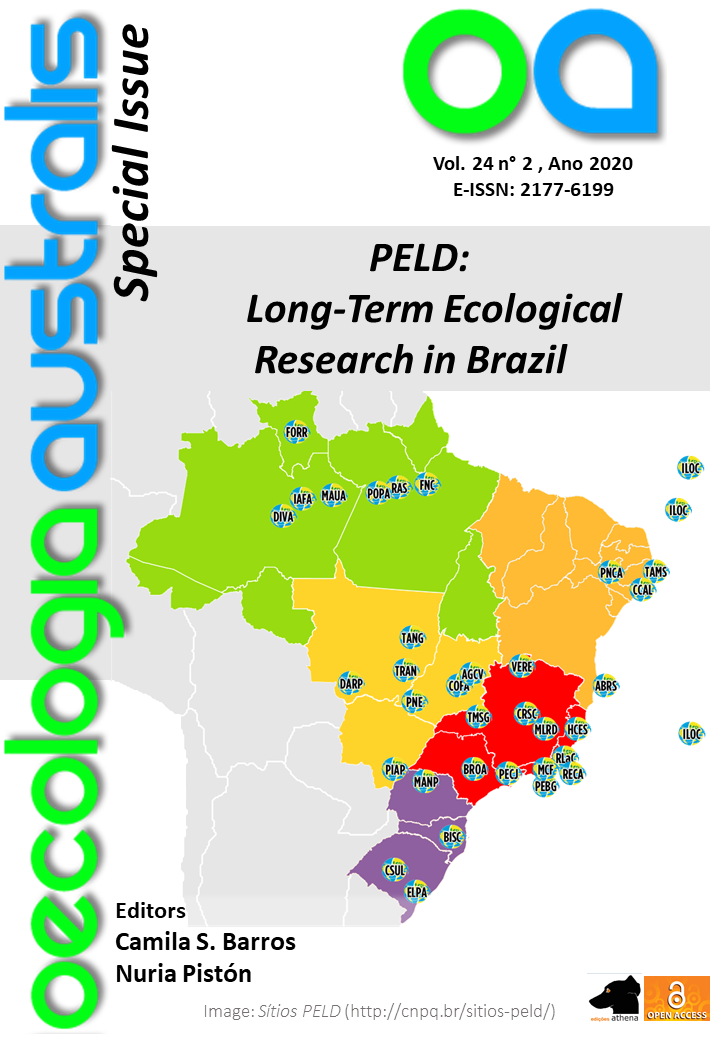PARCERIA ENTRE CNPQ E INSTITUTO CHICO MENDES NO FORTALECIMENTO DOS SÍTIOS PELD EM UNIDADES DE CONSERVAÇÃO FEDERAIS
DOI:
https://doi.org/10.4257/oeco.2020.2402.03Palavras-chave:
problem-oriented research, protected area management, biodiversity conservation.Resumo
A parceria entre CNPq e ICMBio envolvendo sítios PELD em unidades de conservação (UCs) representa uma oportunidade de avançar na integração entre a pesquisa acadêmica e a prática da conservação. As duas instituições trabalharam para melhorar o diálogo entre pesquisadores e gestores no âmbito do PELD em UCs, em oficina que resultou em inovações na Chamada de 2016, com destaque para a valorização da participação dos gestores nos projetos e da difusão do conhecimento junto à sociedade, como subsídio à tomada de decisão em gestão ambiental. Apesar dos avanços conquistados, é necessário acompanhar a execução dos projetos e lançar mão de novos mecanismos para garantir uma efetiva integração entre pesquisa e gestão e os consequentes benefícios para a gestão de UCs e para a democratização do conhecimento gerado nos sítios, como contribuição para superar o atual cenário de desvalorização da ciência e tecnologia e do meio ambiente no Brasil.
PARTNERSHIP BETWEEN CNPQ AND CHICO MENDES INSTITUTE ON STRENGTHENING LTER SITES IN FEDERAL PROTECTED AREAS: The partnership between CNPq and ICMBio involving LTER (PELD) sites in protected areas (PAs) represents an opportunity to advance the integration between academic research and conservation practice. The two institutions worked to improve the dialogue between researchers and managers within the PELD in PAs, in a workshop that resulted in innovations in the 2016 Call, which increased the value of participation of PA managers and diffusion of knowledge to the general public as criteria for project evaluation, as subsidy to decision making in environmental management. Despite these advances, it is necessary to monitor the implementation of projects and to use new mechanisms to ensure effective integration between research and management and the consequent benefits for the management of PAs and for the democratization of the knowledge generated in PELD sites, as a contribution to overcome the current scenario of devaluation of science and technology and the environment in Brazil.
Referências
Albuquerque, E.M.M., Ribeiro, K.T.R, Cariello, M.O, Oliveira, D., Lacerda, F.S, Marini, M.M.G., 2017. A Parceria CNPq-ICMBio na Construção da Chamada CNPq/ICMBio nº 12/2011 – Pesquisa em Unidades de Conservação do Bioma Caatinga. In: Mantovani, W., Monteiro, R.F., Anjos, L. Cariello, M.O. Pesquisas em Unidades de Conservação da Caatinga: Subsídios à Gestão. Fortaleza: Edições UFC, CE, p. 37–80.
Haase, P., Tonkin, J.D., Stoll, S., Burkhard, B., Frenzel, M., Geijzendorffer, I. R., Häuser, C., Klotz, S., Kühn, I., McDowell, W. H., Mirtl, M., Müller, F., Musche, M., Penner, J., Zacharias, S.,Schmeller, D. S. 2018. The next generation of site-based long-term ecological monitoring: Linking essential biodiversity variables and ecosystem integrity. Science of the Total Environment, Elsevier, 613-614, 1376–1384.
ICMBio, 2018a. PRIM - Plano de Redução de Impactos à Biodiversidade: 1. Ed Brasília, DF: p. 59.
ICMBio, 2018b. Plano Estratégico de Pesquisa e Gestão do Conhecimento do ICMBio: 2018-2021. 1. Ed Brasília, DF: p. 83.
Knight, A.T., Cowling, R.M., Rouget, M., Balmford, A., Lombard, A.T., Campbell, B.M., 2008. Knowing But Not Doing : Selecting Priority Conservation Areas and the Research – Implementation Gap. Conserv. Biol. 22, 610–617. https://doi.org/10.1111/j.1523-1739.2008.00914.x
Kueffer, C., Underwood, E., Hadorn, G.H., Holdegger, R., Lehning, M., Pohl, C., Schirmer, M., Schwarzenbach, R., Stauffacher, M., Wuelser, G. & Edwards, P. 2012. Enabling effective problem-oriented research for sustainable development. Ecology and society 17 (4), 1–8. http://dx.doi.org/10.5751/
Lundquist, C.J., Báldi, A., Dieterich, M., Gracey, K., Kovacs, E.K., Scheleicher, J., Skorin, T., Sterling, E. & Jonsson, B.G. 2015. Engaging the conservation community in the IPBES process. Conservation Biology, 29 (6), 1493–1495.
Ostrom, E. 2007. A diagnostic approach for going beyond panaceas. Proceedings of the National Academy of Sciences 104(39), 15181–15187. http://dx.doi.org/10.1073/pnas.0702288104
Pullin, A.S., Knight, T.M., Stone, D.A., Charman, K., 2004. Do conservation managers use scientific evidence to support their decision-making? Biological Conservation 119, 245–252. https://doi.org/10.1016/j.biocon.2003.11.007
Tengo, M., Hill, R., Malmer, P., Raymond, C., Spierenburg, M., Danielsen, F., Elmqvist, T., Folke, C. 2017. Weaving knowledge systems in IPBES, CBD and beyond—lessons learned for sustainability. Current Opinion in Environmental Sustainability 26-27, 17–25. https://doi.org/10.1016/j.cosust.2016.12.005


